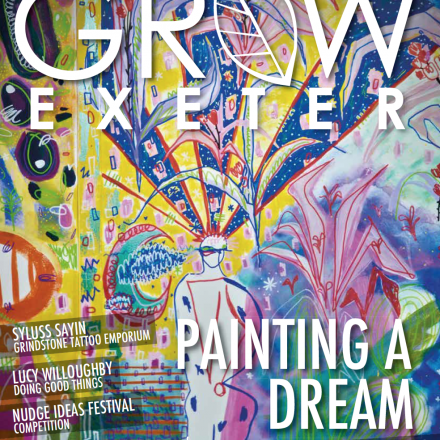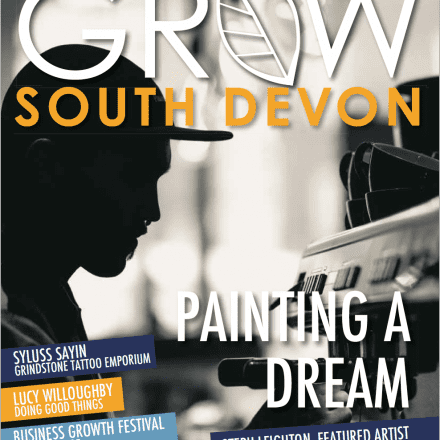
Marissa Wakefield - Art With Heart
Cockington Court has become one of the cultural jewels in the crown of South Devon. Just a mile from Torquay seafront and set within an award-winning country park, the historic manor house is the home of over twenty craft studios as well as a bustling tearoom, a sculpture trail, a walled art garden, a contemporary art gallery and a popular children’s play area. I recently met with the pint-sized creative powerhouse who has been at the spearhead of this amazing community asset since joining in 2011. Meet Cockington Court Centre Director, Marissa Wakefield.
Born and raised in Manchester, with a painter for a Mum and a keen gardener for a Dad, Marissa had an upbringing, with an onus put on hard work, grafting and being humble. Her parents were both cultured and would make a special effort to take Marissa to jazz gigs, art galleries and museums whenever they were able to. She remarked,
“I absolutely loved every opportunity to experience the arts. Very quickly, art became a part of me and it’s all that I could think about.”
As a mid-to-late teen, Marissa orbited around the legendary music scene of eighties/nineties Manchester, even working in The Haçienda – a famously cool nightclub where most of the up and coming bands of the day got their big breaks. She reminisced,
“I met and spent time with all of the bands that went on to make it big. From The Smiths, to The Charlatans and The Stone Roses. They weren’t famous at the time, but I just really liked their music!”.
Marissa went on to study Art at a college in Manchester before doing a degree in Woven Textiles at Loughborough College of Art & Design. She told me how she didn’t really fit in and got frustrated doing a theoretical course in something creative – she just wanted to get out there and start her career as a creative. Finding the course too rigid, she would often sneak into the Fine Art classes that her friends were in and read their books or ask them questions. A lifelong love for textiles and contemporary art was born.
THE TURNING POINT
It was around this time that, as a young and completely undiscovered artist, Marissa was invited to apply to exhibit at the famous Young Contemporaries exhibition at the Whitworth Gallery. Despite feeling like she had absolutely no chance of being successful, she applied and – you guessed it – she was successful! She expanded,
”That was a turning point for me really as it meant that suddenly people took me seriously. Nothing had actually changed in terms of my ability or approach, but it completely changed how I was treated as a creative. The exhibitions left me cold though and I found myself wanting to talk about the work of my friends rather than push myself forward and ‘play the game’ of self-promotion.”
Noticing this lack of personal ambition, a friend commented ‘If there was a job that merged valuing people and working in the arts, that would be perfect for you!’. Little did Marissa know how true this was to become.
She moved into a role at Quarry Bank Mill Textile Museum in Cheshire – initially making tea and sweeping up. The museum was home to some of the world’s leading practitioners of Fine Art and Textiles so, as well as doing her job, she kept hanging around and absorbing as much as she could from them. Some of them in particular took her under their wing and showed her some of their techniques and tricks of the trade – many of which she has treasured to this day.
After developing and progressing within the organisation, she eventually took over leadership of the project, as she had become a part of the furniture there and had built fantastically strong relationships with the other artists. Marissa commented,
“I ended up running the project, although I didn’t mean to! I felt like I grew up there. The National Trust is an amazing place to learn in a hands-on way. They have a culture where no-one is too proud to roll up their sleeves and get their hands dirty. This means that, particularly for those who learn by doing rather than theory, the opportunity to learn new skills (both creatively and professionally) is plentiful.”
At this point in her career, she felt a bit stuck in the world of contemporary art and started getting interested in artefacts and ancient history. Manchester Museum was one of the national epicentres at the time for this sort of exhibition so she went to one of them. It was an ethnic and tribal art exhibition organised by the legendary Gordon Reece, one of the most legitimate global voices in ancient artefacts. She was blown away by what was being exhibited and how it was being displayed.
Marissa stated,
“He had a real presence as a person. I went and introduced myself and he eventually became a friend and mentor to me. I can’t tell you how much I learned from him over the years. He particularly taught me to ignore the naysayers who tell you that what you are doing is going to fail (of which I’ve had many over the years). He also showed me that most good business ideas should be executable regardless of geography. He proved this by starting what became a nationally recognised gallery in Knaresborough, Yorkshire which some of the most important people from the world of art would travel to in order to interact with and buy some of the incredible artefacts that he had sourced on his travels.”
CREATIVE COLLABORATION AND HUMILITY
Marissa moved to Knaresborough to work with Gordon and she became the gallery’s curator of ethical, tribal jewellery and textiles. Here, she helped Gordon to source, exhibit and educate others on the artefacts that he found from all over the world. She loved the role but, quickly, missed contemporary art.
As luck would have it, a brand-new, purpose-built arts centre opened down the road, built in conjunction with the Arts Council. It was a centre for those with disabilities – particularly those with visual impairments. Marissa explained,
“It was such a wild project! Teaching the visually impaired and enabling them to express themselves through art and crafts was so cool. There is no better feeling than putting that creative power into someone’s hands. To see them realising that they CAN do something, even despite their personal restrictions or challenges is incredible. I’ll never forget that job.”
At this point in our conversation, I noticed a few patterns starting to emerge from Marissa’s story. One of them was that she has always focused on making herself professionally replaceable – training up others to fill her shoes and then going to find a new challenge elsewhere. She had enjoyed the fruits of just such a training and development model earlier on in her career and it was lovely to hear that she had continued to pass that on (and does so to this day).
I asked her about this character trait and she, somewhat bashfully, commented,
“I’ve never been ambitious for myself but for the place, I quickly realised that personally ambitious people rarely made a success of themselves in the world of art. You’ll always get your flashes in the pan and big egos but, in terms of longevity in the industry, one of the common characteristics of successful creatives is a spirit of collaboration and humility.”
She continued,
“Quite often when people hear my job title, they expect me to be rather self-important. When they meet ‘little old me’ it is often a shock to the system and I enjoy seeing their expectations and pre-judgements crumble as they realise that it is actually possible to be successful AND supportive of others in the world of creativity.”
After a career break due to pregnancy and a couple more job roles (including her first CEO role, which saw her successfully turn around a struggling arts charity), Marissa’s partner Stuart saw a job advert in The Guardian for a Centre Director role at Cockington Court, near Torquay. The property housed artisans and creatives in small units within the manor house, as well as having a variety of communal spaces both inside and outside. As for the role itself, it mixed her passions for contemporary and heritage art along with a chance to shape the future of the amazing property and the part that it played in the local community.
FALLING IN LOVE WITH DEVON
It took her a short while to get over the geographical upheaval of moving from ‘up North’ down to Devon but, she told me,
“As soon as I got here for the first time, I fell in love and saw a challenge ahead. My mind was made up very quickly that I wanted to take on this project. It had lots of potential it but I could also see that it needed someone with energy and vision to take it on and push it forwards. For the last eight years, I’ve had the pleasure of that person being me!”.
It was intriguing to hear Marissa’s account of her early days at Cockington Court. She explained,
“I think there were some unresolved tensions which I walked into and I certainly had some opposition early on. But that spurred me on to prove my abilities and credentials through my actions and results, not my title or my CV. It was tough at the start, but I stripped some luxuries away in order to embrace a ‘foundations-up’ approach to taking the project forward.”
She continued,
“The only income that the project had at the beginning was money from one car park. I quickly realised that the project needed to diversify sources of income quickly if it was going to survive. A common misconception is that we receive European funding but that hasn’t been the case since 2011! With a lot of hard work, a dedicated team, some hard decisions and amazing ongoing support from TDA, we aim to make ourselves financially sustainable.”
Marissa told me that the first big thing to change was that they started offering weddings. They quickly realised how popular that offering was, hosting ninety-eight weddings in the first year that they became a wedding venue. Popularity continued to increase and attracted the local registry office to occupy space within Cockington Court to carry out the smaller ceremonies. Cockington Court has gone on to become one of the leading wedding venues in Torbay.
Marissa continued to review and rethink the space and went on to open new galleries on-site. She had once worked for the National Portrait Gallery so she was able to design, hang and display artwork to a high standard. She renovated the gallery space, with the help of funding from TDA and went about creating a showcase for all of the local artisans, makers and those housed within Cockington Court, creating a community of artists and creatives. This sort of ‘change management’ is both taxing and can take some time, but Marissa pushed through – earning the trust of the tenants and slowly moving them towards her vision of a preferred future.
PURSUING A CREATIVE VISION
So, what of that preferred future? Well, now with a full occupancy of over twenty-seven tenants (a first for the project) and an equally healthy diary of events the whole year around, the project is in better shape than ever before. Add to that their Sculpture Trail which launched in partnership with local Sculptor Phil Dixon three years ago and has gone from strength to strength every year since and you can see how Marissa really has brought something special to her role at Cockington Court.
She commented,
“I feel a strong internal sense that my purpose on earth is to find and nurture other creatives. That’s what gets me up out of bed in the morning and what I find myself holding on to, through thick and thin. You can’t please everybody. I do my best but there comes a point where, as long as you have the right people supporting you, you just have to push on and use your intuition and just start doing the things that you have a vision for.”
Marissa also has a vision and a passion to explore and educate visitors on the heritage of Cockington Court. She explained,
“In a fun, creative way, I want to educate visitors on the history of this amazing place. It has such a rich and interesting history, with lots of positive heritage but also with a healthy dose of drama and controversy along the way too. I feel that finding out more about the past can help us to make sense of the present. I’d love to do that in innovative ways with Cockington Court. It is a magical place and it deserves to be celebrated and have its story told.”
She concluded,
“I don’t want us to be an austere, clinical place. I want Cockington Court to be an inviting place that breaks boundaries, embraces diversity and becomes a vibrant community hub which celebrates both local heritage and also looks ahead to an exciting future for the area. I just want to know that we’ve played our part in the ongoing transformation and improvement of this amazing part of the world.”
Follow the amazing progress of Cockington Court @CockingtonC on Twitter
All content by Joff Alexander-Frye











Loved reading your story Marissa 🙂